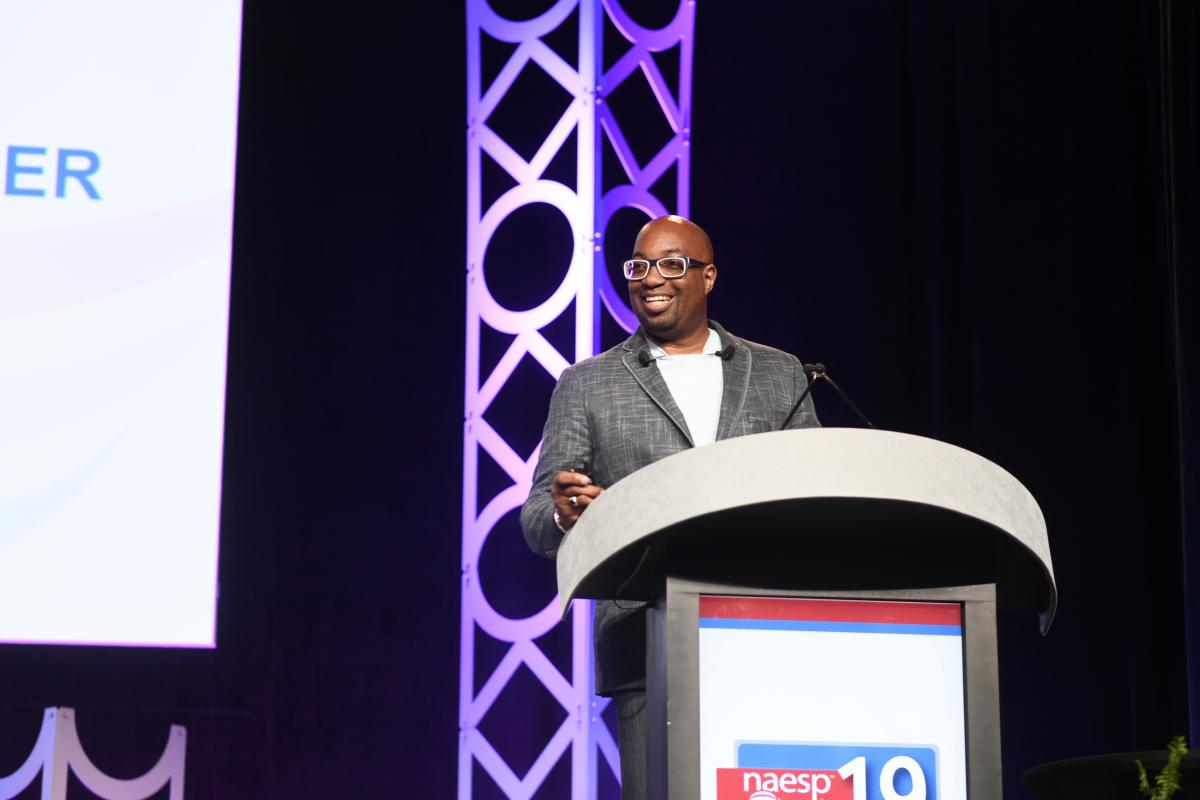A Way With Words
Poet Kwame Alexander told five beautifully intertwined stories that resulted in a major takeaway: Words can change the world.
Poet Kwame Alexander told five beautifully intertwined stories that resulted in a major takeaway: Words can change the world.
By Liz Garden
Communicator
July 2019, Volume 42, Issue 11
Kwame Alexander speaking at the conference’s closing general session. Photo courtesy of Lifetouch®.
Inspire. Motivate. Persuade. Encourage. Influence. Move. Stir. That’s what the recent NAESP Pre-K–8 Principals Conference in Spokane, Washington, set out to do for leaders in education. And closing out the conference with keynote speaker Kwame Alexander, an author and a poet who has a way with all of those words and so many more, was the best way to inspire attendees to go forward and bring about change in their schools.
Alexander’s closing keynote might have signaled the end of the conference, but those of us in the audience knew it actually marked the exciting beginning of an empowered year of making a difference in the lives of children.
Life Lessons
We all sat mesmerized in the audience as Alexander spoke, his stories, lines of poetry, and lyrical voice sharing five life lessons that he has learned over the years from the inspiring teachers and principals in his life. Imagine being the son of a mother who was an educator and a principal and a father who was also an educator and a principal.
Lesson No. 1: Alexander learned from an early age that words have power. Words can transform your experiences, and because of that, we need to be teaching all of our kids the power of words.
Lesson No. 2: Another life lesson that Kwame learned came after his father brought him along to a protest march where he joined in chanting, “We’re fired up. We can’t take no more!” We all need to remember to find and lift our voices, he said. We live in a time where more than anything we certainly need to help all young people find and lift their voices.
Lesson No. 3: We have all had that teacher who pushed us and challenged us. For Alexander, that was poet Nikki Giovanni. After having Giovanni as one of his professors and feeling like she did not like him, Alexander had formed this idea in his head that she did not support him, leading him to strongly dislike her. But several years after forming these opinions in his mind, Alexander read an article where Giovanni stated, “Kwame Alexander is my literary son.” When he reconnected with her—and apologized for not always thinking positively about her—she reminded him, “My job was not to judge but rather to help you become who you needed to be.” How can we, as principals, take that mindset and help those in our schools—both students and staff—become who they need to be?
Lesson No. 4: This lesson focused on using literature to transform the lives of kids. He shared a story of connecting with a middle school student during a whole school assembly. He spoke with and to that student as if they were the only two people in the gym, stressing that this student (and all of the others listening in on their “private” conversation) needed to believe that words can change the world. The words that students read in books and poems have the ability to transform them, and kids, in turn, can then use their own words to change the world. We need to be putting the books in the hands of students, showing them the power in words, and then nudging them to find their own powerful words to share with the rest of the world.
Lesson No. 5: As tears streamed down my face, I embraced Kwame’s final lesson of his closing keynote. He shared the painful story of his mother’s death. While he was working to meet a deadline to finish writing his book, his mother, his first librarian who had taught him to lift his voice and share it with the world, lifted her voice for one final time and took her last breath.
Inspire, the first word I typed in this post, comes from the Latin word ‘inspirare,’ meaning “to breathe into.” Alexander’s mother had spent a lifetime breathing into her son all of the words and wisdom that she could share with him. And now he has chosen to continue breathing into this world, inspiring so many others, with his words and wisdom.
Giovanni, known as a woman who didn’t attend funerals, came to mourn with Alexander. There, when he asked why she decided to attend his mother’s funeral, Giovanni said, “You just lost your mother, and you have to know you still have a mother.”
Takeaways
We aren’t just teachers and principals and educators to the students in our schools. We are their mothers and their fathers. As Kwame said, “It’s beyond testing. It is sacred work we are doing. It’s changing lives. Education work is real stuff. We are saving lives [and] we are creating better humans to create a better world.”
Thank you, Kwame Alexander. I listened to your words. I wrote your words. I recited your words. I tucked your words into my suitcase and brought them back to my school and my kids. I am going to carry your words with me and share them throughout the school year. I hope to breathe into those around me, to inspire my students as you inspired all of us during your closing speech. I am ready to change lives.
Liz Garden is principal of Mayo School in Holden, Massachusetts.
—
Copyright © 2019. National Association of Elementary School Principals. No part of the articles in NAESP magazines, newsletters, or website may be reproduced in any medium without the permission of the National Association of Elementary School Principals. For more information, view NAESP’s reprint policy.


